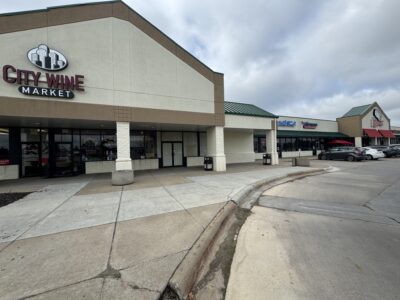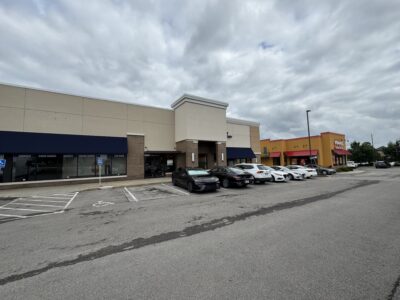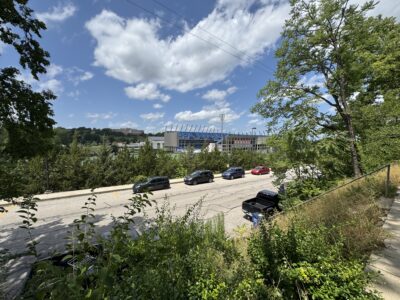
A look at the stakes and the possible debates in the tax dispute between The Oread and City Hall

The Oread Hotel, 1200 Oread Ave.
Sometimes you win in the court of law, but lose in the court of public opinion. Other times it is vice-versa. I can’t help but think that thought is going through the minds of some City Hall leaders these days.
This $500,000 tax dispute between the city of Lawrence and the developers of The Oread hotel project seems likely to create some interesting legal wrangling. New documents released by the developer certainly have made that clearer. But if it turns into a lawsuit, it sure appears City Hall leaders have an interesting calculus to consider: It is important for the city to win the judgment of the court, but it is critical that it win the judgment of the public.
In other words, the city probably has more at risk in the court of public opinion than it does in the court of law.
As it stands now, the city’s biggest risk in the court of law is about $500,000. That’s approximately the amount of the tax dispute. But that amount creates no real risk to the city’s finances. The $500,000 in disputed taxes have never been budgeted. It is not like the city will have to cut funding for something if it doesn’t receive it. (To be clear, not all the money would go to the city. Some would go to the county, and a special 1 percent sales tax that is charged in the district would theoretically be rebated back to the consumers who paid it.)

photo by: Mike Yoder
The Oread Hotel, 1200 Oread Ave.
But I think the stakes are much higher in the court of public opinion. As we reported, The Oread development team released a large number of documents recently describing its position in the dispute. It is easy to see in those documents some potentially successful legal arguments. It is more difficult to see anything that is going to change the public’s opinion that the developers are misusing a city incentive program.
If the city doesn’t do everything it can to impose some type of penalty on the development team, I think the City Commission risks losing large amounts of trust with the public. At least that’s what I hear from people who stop me on the street to talk about it. To make matters worse, trust levels aren’t that great currently, following the Rock Chalk Park controversy that the city had with Thomas Fritzel — the same Lawrence businessman at the center of The Oread development. There are other Fritzel/City Hall controversies that continue to weigh on the mind of residents. If the camel’s back hasn’t already broken, it seems like this will do it.
So, let’s take a closer look at the new set of documents released by the development group to see where future battles may be waged in this dispute:
• One of the documents produced by the development group is called “Setting the Record Straight: The Facts of Oread Redevelopment District.” Expect exception to be taken to some of these facts. There is at least one statement in that document that isn’t a fact. Statement No. 2 reads: “Oread Inn is owed approximately $11 million plus interest for improvements that, absent the Redevelopment Agreement, would have been paid and financed by the City. There is no dispute of this fact.” It certainly is not a fact that the city would have paid and financed all of these improvements if this deal hadn’t been reached. Indeed, the $11 million in improvements do include numerous pieces of public infrastructure — items such as streets, sidewalks and other such projects — that likely needed city attention whether The Oread project proceeded or not. But it is important to remember that the majority of the $11 million in improvements is for a privately owned parking garage that is beneath The Oread hotel. There was never a scenario where the city was going to pay for or finance that approximately $6 million private parking garage.

photo by: Mike Yoder
The Oread hotel, 1200 Oread Ave, is pictured on Jan. 22, 2016.
• $4.5 million may be an important number in all of this. That is approximately the amount of sales the development group once said were made inside The Oread’s special taxing district but is now saying were made outside the district. The development group made the change by amending the tax returns for Oread Wholesale. What did those sales involve? I’ve asked an attorney for the development group for more information about those sales, but did not receive any more details. What those sales involved go to the heart of the matter. City officials believe the development group was willfully inflating the sales of the special taxing district in order to get a larger sales tax rebate from the city. The fact that the development group has removed $4.5 million in sales from the district says that sales were improperly allocated to the district. The development group will strenuously argue otherwise. Attorneys with the group sent me a message stating the amended returns shouldn’t be read as a “determination” that sales were improperly made to the district. Instead, the amended returns were a voluntary effort to “compromise and cooperate with the city.” But if that line of logic stands, it raises other questions. Are sales tax returns meant to be an accurate depiction of sales activity, or does the state allow them to be changed to facilitate deals?
• There may be an argument brewing over what constitutes a warehouse. The terms of the special taxing district are pretty clear that one of the prohibited uses in the district is a warehouse. The city is contending that Oread Wholesale was operating a warehouse in the district, and thus the city has the legal authority to now void the special taxing district deal. Indeed, documents released by the development group confirm that Oread Wholesale has space within the hotel building where it stores and displays materials that it later sells. The attorneys have confirmed the location has handled sales of construction materials for projects throughout the Lawrence area and beyond. But the developers argue that is not a warehouse. The attorneys told me it is not a warehouse because “Oread Wholesale does not store property owned by third parties for a fee.” Instead, Oread Wholesale “stores its own inventory, pending the retail sale of such inventory.” Now, the bar exams I’ve passed are different than the ones attorneys are required to pass, so I’m no expert on the legal ins-and-outs of the definition of a warehouse. My qualifications mainly end at typing in the URL dictionary.com with a minimum of typos. Among the definitions of a warehouse on that site: “A building, or a part of one, in which wholesalers keep large stocks of merchandise, which they display and sell to retailers.”
• And finally, what would a dispute be without an alley. The alley behind The Varsity House, an apartment complex developed by a group led by Thomas Fritzel, will be debated. A good amount of the disputed sales taxes come from sales tax charged on construction materials for The Varsity House. The developers are contending those sales took place inside the special taxing district, even though there is agreement that The Varsity House project is not inside the special taxing district. Whether the sales are in or out adds up to a significant amount of money for the development group. If the sales are determined to be made outside the district, The Varsity House developers — which includes some of the key Oread developers — must pay the full amount of sales tax on construction materials, and they get none of it rebated back to them. But if the sales are made in the district, The Oread development group gets a rebate on the majority of the local sales taxes paid for the construction materials.

photo by: Mike Yoder
The reconstructed Varsity House is pictured at the northwest corner of 11th and Indiana streets.
The argument that the development group is making is that most of the construction material sales for The Varsity House were delivered to the public alley that is behind The Varsity House, which is just down the block from The Oread hotel. That public alley is part of the special taxing district. Under state law, since the delivery was made there, that is where the sales tax must be charged, the development group argues. Thus, under the terms of the special taxing district, The Oread developers get a sales tax rebate.
But here is where it gets a little tricky to follow. When the construction materials arrived at the alley, they weren’t owned by Oread Wholesale. They were owned by whatever company Oread Wholesale ordered them from. Oread Wholesale would purchase the materials in the alley, and then store the materials in the alley before it sold them to the contractor for The Varsity House. “For deliveries to the alleyway, Oread Wholesale would retain ownership and possession of the construction materials when delivered,” a developer-commissioned report by the accounting firm BKD reads. The report goes on to say the products were later sold to DFC, the contractor building The Oread.
That raises a question: Does a wholesale company have to get any permission from the city to use a public alley as a storage facility for its business? I have little doubt that DFC had city permission to store construction materials in the alley, but whether Oread Wholesale had such permission may be a different matter. I asked the attorneys for The Oread group for any documents showing such permission had been granted, but I didn’t receive any.
The larger question, though, is one about intent. I covered the City Hall approval process for The Varsity House. Never did the developer mention that the project would be adding sales to the special taxing district. Why not? You could argue that would be a selling point for the project. The more sales that occur in the district, the quicker the $11 million cap is reached, and the quicker the city and county begin receiving the full amount of sales taxes from The Oread. One reason it was perhaps never mentioned is because it could be seen as a tax break for some members of The Varsity House development. (Remember, The Varsity House paid the full amount of sales tax due, but a good portion of it got rebated back to The Oread group, which also includes members of the The Varsity House group.) As someone covering the issue, I can tell you that it wasn’t likely that the City Commission was going to be in favor of giving The Varsity House project any such tax break.
The issue of whether the special taxing district is being used in the manner that was described when it was approved by the city is really at the heart of the matter for the public, I believe. Did the city approve one thing but actually get something else?
So, there are lots of issues to resolve, and I don’t have a good sense of how they will be resolved. It will be interesting to watch how long it takes to resolve them. One fact that gets overlooked is that the city has stopped making tax rebate payments to The Oread group. The Oread group has been counting on those tax rebates to pay for the $11 million worth of work that it financed at the project. Presumably, the development group is still obligated to make those debt payments even though the tax rebates aren’t currently being received. It would seem that a lawsuit with this many things to argue could be pretty lengthy, which could mean the tax rebates may be halted for quite some time. The city may be on the correct side of the leverage equation here.
I suspect that is just one of many calculations to come in this case.







